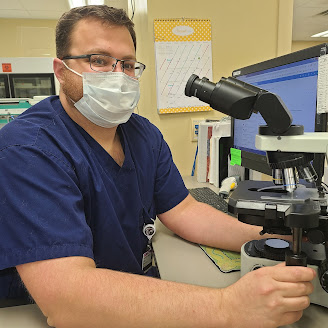Dillon Spires was in his last semester at Trident Technical College and nearing graduation from the Medical Laboratory Technical (MLT) program last Spring when COVID-19 hit.
“I remember walking into clinical thinking that COVID-19 would certainly become an issue soon. That same day clinicals were canceled until further notice,” he said.
While this could have delayed his graduation from the program, MLT faculty worked with him to fulfill the remaining clinical requirement. He was already working as a Lab Assistant at Roper St. Francis Mount Pleasant Hospital, so he was able to use some of his work experience to fulfill clinical requirements and schedule training time for the areas that he still needed clinical experience.
Spires joined the Air Force in 2011 after graduating high school in Eastman, Ga. He served for seven years, first in Omaha, Nebraska supporting reconnaissance aircraft and then at Joint Base Charleston supporting C-17 aircraft. He met his future wife in Nebraska and traveled to the UK, Okinawa, Greece and Qatar during his time in service.
After his medical retirement from the Air Force in 2018, he did not know what he wanted to do but knew it needed to be intellectually challenging, centered around science and have career advancement opportunities.
“I found all that in Trident Tech’s MLT program,” said Spires.
Medical laboratory technicians perform routine tests in all areas of the clinical laboratory, searching for basic clues to the absence, presence, extent and causes of diseases. This skilled position is responsible for performing laboratory tests efficiently and accurately for high-quality patient care.
Spires said, “MLT is great for people who love science and are curious. They are problem-solvers who enjoy working behind the scenes. We don't work face-to-face with patients that often and for some people, that is a perfect fit.”
MLT can provide great financial security or serve as a springboard to greater opportunities. An MLT degree and an American Society of Clinical Pathologists (ASCP) certification can be used to pursue a Medical Laboratory Scientist (MLS) degree, which brings a pay raise and opportunities to fill supervisory positions. Other pathways available to an MLS include medical school, pathologist assistant program, healthcare administration, or positions in industry (i.e., instrument development, instrument technical representatives or sales).
Spires started the MLT program in January 2019 and within a couple of months applied for the job at Roper.
“I was hired for the job and it was one of the best things I could have done for my academic success. Seeing what goes on in the work environment really helped me grasp the subjects we were covering in school,” he said.
Upon graduation, Roper hired Spires as a medical lab technician.
He said, “Overall this was a great experience for me. I was able to graduate on time and learn the way the lab operated at my future place of employment. My education and time as a lab assistant were both valuable preparation for my current job."
Spires' on-the-job training has proven especially beneficial since the COVID-19 pandemic has increased the workload and brought about changes in the lab. The lab has several different tests for COVID-19, as well as patients requiring a lot of routine lab testing.
"I tell people that I am working 'behind the front lines,'" he said.
Spires is now pursuing a bachelor’s degree in medical laboratory technology at Charleston Southern University. He intends to apply to medical school and train to be a pathologist after completing his four-year degree.
Spires' wife, Hope, is a student in Trident Tech’s Nursing program. She too works at Roper St. Francis Mount Pleasant as a Patient Care Technician. Upon completing her associate degree, she plans to work as an ICU nurse while working toward a bachelor’s degree. From there, she is considering a few career paths, including nurse anesthesiologist and OR nurse.
Learn more about the Medical Lab Technician program at TTC.
Spires' wife, Hope, is a student in Trident Tech’s Nursing program. She too works at Roper St. Francis Mount Pleasant as a Patient Care Technician. Upon completing her associate degree, she plans to work as an ICU nurse while working toward a bachelor’s degree. From there, she is considering a few career paths, including nurse anesthesiologist and OR nurse.
Learn more about the Medical Lab Technician program at TTC.



Comments
Post a Comment